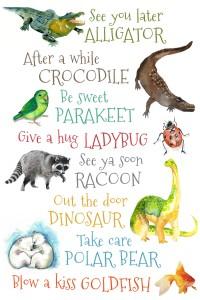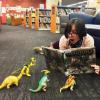Posted by Morgan on Wednesday, Sep 30, 2015
Today we visited a topic near and dear to every librarian's heart: intellectual freedom. It's banned books week so of course we had to read some banned and challenged books. We started storytime off as usual with our welcome song, "Clap Everybody and Say Hello." I explained that challenging a book is an attempt by a person or group of people to have materials restricted or removed, while banning is actually removing those items from the collection. One boy summarized the concept as, "they don't like those books." I also talked briefly about how it is often parents or other adults challenging books in an attempt to protect children from difficult ideas and information, but that the library believes in intellectual freedom. We believe that only parents have the right and responsibility to restrict access to ideas to only their children and no one else. A bit of serious talk for storytime, but an important subject. I told everyone I would be reading some banned and challenged books and that they could guess the reasons for the challenge or ban after each story.
Then to get us in the mood for some stories, I led the room in a nursery rhyme.
Old Mother Hubbard Went to the cupboard, To give the poor dog a bone; When she came there, The cupboard was bare, And so the poor dog had none.
Poor puppy! After another repetition for those new to the rhyme, we moved on to our first story, Walter the Farting Dog by William Kotzwinkle and Glenn Murray.
A lot of voices shouted out "because he farts" as the reason behind this challenge, which was pretty on target. This story in which a family learns to appreciate and love their especially flatulent dog was challenged for its use of the words “fart” and “farting” 24 times.
We aired out our voices by doing a quick counting finger play. This little cow eats grass, (hold up one finger) This little cow eats hay, (hold up two fingers) This little cow drinks water, (hold up three fingers) This little cow runs away. (hold up four fingers) And this little cow does nothing at all, (hold up five fingers) But lie in the fields all day. So we'll chase her, (makes running motions with fingers) And chase her, And chase her away!
The next story was one of my favorites growing up, The Story of Ferdinand by Munro Leaf.
This was a tricky one, since it was banned in another country, and no one today could figure out why it had been banned. This story about a little bull who doesn't want to fight, but enjoys sitting and smelling flowers all day, was banned in Spain during the Spanish Civil War for promoting pacifism.
Sometimes out-dated ideas stick around in the form of nursery rhymes, which we change to suit present day sensibilities.
There was an old woman who lived in a shoe. She had so many children, she didn't know what to do; She gave them some broth without any bread; Then kissed them all soundly and put them to bed
That last line was originally "Then whipped them all soundly and put them to bed." The kinder version is an example of subtle censorship.
For our last book, I read The Family Book by Todd Parr.
This story about celebrating and accepting all different kinds of families was banned in an Illinois school because it "discussed different types of family structures" and "those are issues that shouldn’t be taught at the elementary school level." Only one girl guessed this reason correctly.
Then it was time to say goodbye, so I had everyone repeat after me in saying our goodbye chant that I am trying to incorporate after each storytime.

Our finale was an animated movie of the The Three Little Pigs by James Marshall. The book was challenged on the basis of violence and possible offense to Muslims for the eating of pork.
Enjoy your freedom to read!

